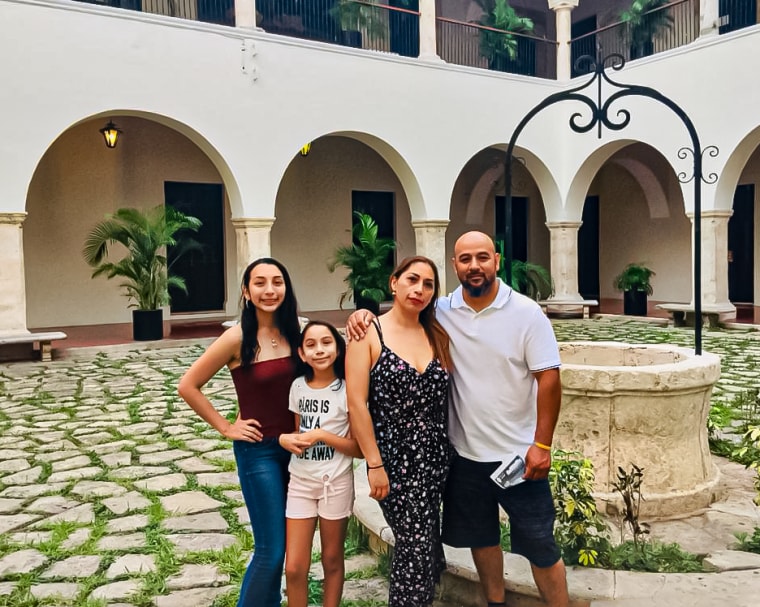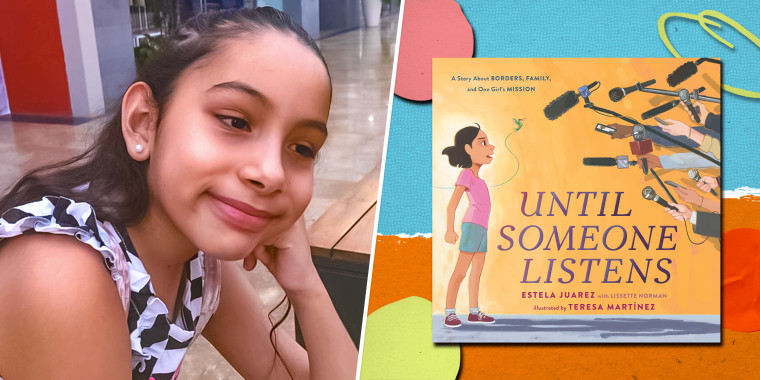Estela Juarez, 14, who wrote a children's book about her mother Alejandra's deportation to Mexico, is back with her mom but says her family continues to suffer from the effects of family separation.
"I want to become a senator one day to change immigration laws," Estela tells TODAY.com, adding that she is writing her second book, a young adult novel about her life experiences.
"Until Someone Listens," was published by Macmillan on Sept. 13, 2022 and co-written with Lissette Norman. The book is a recollection of Estela's childhood memories: learning that her mom did not have documentation ("a man from the government came to our house"), watching Alejandra be deported to Mexico ("It felt like someone ripped us in half") and living apart.
"I was a cloud — a gloomy cloud that sits and stays," Estela wrote.

In 2021, after living apart from her family for three years, Alejandra, 44, was granted a one-year humanitarian parole, which was extended until May 2023. Alejandra says she has been granted another extension until May 2024.
She's now back in Davenport, Florida, living with her Army veteran husband Temo Juarez, who is a naturalized American citizen, and daughters Estela and Pamela, 21. With her future uncertain, Alejandra has decided against re-applying for humanitarian parole when her status expires next year.
"I am looking into either moving to Canada on a student visa or moving back to Mexico and trying to build a life there," Alejandra tells TODAY.com. "I am hoping that Estela will (eventually) come live with me for one year. Pamela is a student at the University of Florida and my husband will visit me in Mexico whenever he can."
Alejandra's story starts in the late 1990s, when she came to the U.S. as a teen seeking asylum, hoping to leave behind dangerous living conditions in Mexico, she explained in the 2019 Netflix docuseries "Living Undocumented."
Related: ‘So, are you an alien?’ What it was like to grow up as an undocumented immigrant
According to Alejandra, she applied for work visas to live in the U.S. on three occasions, but her applications were rejected. So Alejandra decided to enter the U.S. at the border of Laredo, Texas by falsely declaring herself a U.S. citizen.
She was caught and sent back to Mexico; however, her second attempt worked.
Alejandra moved to Florida, where she met Temo at a gym and fell in love. The couple married in 2001 and ran a flooring installation business while happily raising their daughters, until a 2013 traffic stop exposed Alejandra's legal status.
Estela recalled the night an immigration officer knocked on their door and she learned her mom's secret. “I was 4 years old and I was scared,” she told TODAY Parents. “My mom told me, ‘I am not as lucky as you. I came to the U.S. without papers.’”
Alejandra was placed under an order of supervision and required to check in with Immigration and Customs Enforcement (ICE) every two years.

That procedure changed when President Donald Trump took office in 2016 and imposed stricter immigration policies. In 2017, the U.S. Department of Homeland Security stated that "all of those in violation of immigration law" would be subject to arrest, detainment or removal from the country.
Alejandra learned she would be deported from the U.S. Her nightmare turned into reality on August 3, 2018.
"I dreaded going to sleep the night before she left because I knew when I woke up, I would say goodbye to my mom," said Estela. "No child deserves to be without her parent. Those days were terrible."
Related: 23 beautiful kids' books to celebrate and honor Hispanic Heritage Month
Alejandra went to the Yucatan Peninsula, where she found an apartment, paid in part by GoFundMe donations, and worked "here or there" jobs translating English legal documents.
The family splintered further as they decided to have Estela live in Mexico with her mom, a plan made possible because Alejandra had previously requested dual citizenship for Estela. Pamela stayed in Florida with Temo.
When the COVID-19 pandemic began, Estela flew back home to live with her father and sister in Florida.
There, Estela wrote letters to government officials, including President Trump, asking for her mother to come home.
Following the Netflix series, Estela was asked to read that letter at the 2020 Democratic National Convention during President Joe Biden’s presidential run.
"My name is Estela, I'm 11 years old," she said in the televised reading. "My mom is my best friend. She came to America as a teenager over 20 years ago without papers in search of a better life. She married my dad, who served our country as a Marine in South America, Africa and Iraq. My mom worked hard and paid taxes ... now my mom is gone."
Estela told TODAY.com that she wanted her letter read to the world. “Honestly, I wasn’t scared. I knew I needed to bring attention to the issue.”
Last year, with help from Florida congressman Darren Soto, Estela and Alejandra wrote letters to President Biden asking him to reunite their family.
"Dear President Biden, I hope you remember me. My name is Estela Juarez .... I think you would like my mom," she wrote. "I know she came to the U.S. illegally, which was wrong, but she was a teenager and all alone when she saw a crime and had to run away to save herself. She is brave and strong."
Estela added, "Now another holiday season has passed. It has become the saddest part of the year. My mom (always used) to listen to music and sing along when she cooked for the holidays. Now when I walk by our kitchen, it is quiet. There is no smell of her vegetable soup filling the house, making me hungry."
Together now, though temporarily, the family savors daily walks and cooking Estela’s favorite chicken flautas. Alejandra is waiting for her work permit to arrive, however due to a backlog in applications, she cannot get a job.
Alejandra says the days drag waiting for Estela to return from school.
"I am grateful to President Biden but I need a permanent solution in order to heal," says Alejandra. "I don’t want to live this way for the rest of my life."
Rep. Soto has re-introduced a bill called the "Protect Patriot Spouses Act" in honor of Alejandra and other military spouses, to make it easier for undocumented spouses of military service people and veterans to stay in the country.
Alejandra says she does not regret her decisions.
"I gave my children the best gift I could possibly give them," she says. "I want them to make something of themselves in the way I couldn't."
Alejandra says she often asks Estela why she keeps writing. "She still has hope (for our family)," says the mom. "Estela is a very positive person, thank god."
Estela's second book, which she is in the process of writing, is geared toward young adults and goes further into her experience as the daughter of an undocumented immigrant.
"I like to see (my writing) as something beautiful that came out of a sad situation," says Estela. "It's my project to share with the world."
During Hispanic Heritage Month, TODAY is sharing the community’s history, pain, joy and pride. We are highlighting Hispanic trailblazers and rising voices. TODAY will be publishing personal essays, stories, videos and specials throughout the month of September and October. For more, head here.
